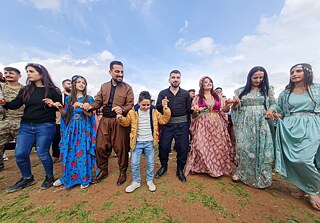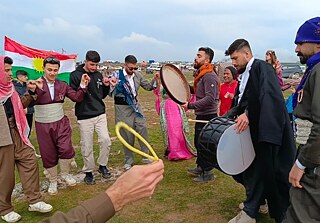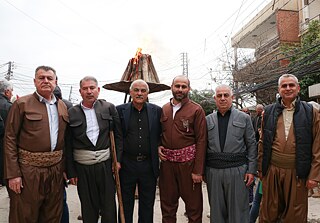Syria’s 2.5 million Kurds, predominantly Sunni Muslims, observe Newroz, joining diverse ethnic groups from around the world in celebration. This year, Syrian Kurds struggled to choose between this tradition, deeply intertwined with their identity, and their faith as Newroz and Ramadan, Islam’s holiest month, coincided for the second time in 34 years.
In the alleys of Qamishli’s bustling markets, the unmistakable, sweet smell of ma’arouk, a cherished Ramadan delicacy, wafts through the air as vendors tout their wares of colorful fabric and ornate lanterns – there is no doubt that the city has become alive with the spirit of the Muslim holy month.But the anticipation of Ramadan was not the sole focus of the Kurds. The same streets that are awash in Ramadan decorations were adorned on March 20 with the red, white, green, and yellow of the Kurdish flag.
Many market goers were purchasing traditional outfits, accessories, flags, and picnic essentials ahead of Newroz, the Kurdish New Year celebration, which is observed on March 20. And, while some shoppers talked of the gorgeous, indulgent festivities that were held in celebration of Newroz, others say they preferred to spend the eve of the 21st praying tarawih, the late-night prayers.
Walking down the streets of this Kurdish stronghold on the day of Newroz, a tug-of-war could be sensed between two cultures vying for coexistence, which placed the predominantly Kurdish population of the city at the center of a dilemma.
Syria’s 2.5 million Kurds, predominantly Sunni Muslims, observe Newroz, joining diverse ethnic groups from around the world in celebration. And, while for the majority of the 300 million people that commemorate it, the new year’s celebration is one of peace, solidarity, and reconciliation, for the historically marginalized Kurds, however, it symbolizes a reclamation of an identity that has been facing the threat of erasure for decades.
This year, Syrian Kurds struggled to choose between this tradition, deeply intertwined with their identity, and their faith as Newroz and Ramadan, Islam’s holiest month, coincided for the second time in 34 years--after it coincided in the corresponding month of the year before.
Newroz is haram
On Newroz, the lush gardens of Qamishli teemed with the joyous laughs of families gathering for picnics and barbecues, relishing the crisp, fresh air. In their hands, Kurdish flags flutter in the breeze. The drums’ thunderous pounds set an old, familiar rhythm in motion. The men and women, clad in floral-patterned sashes cinched around their waists, held hands, lowering religious barriers to perform the Kurdish dabke, a traditional folk dance, in celebration of the new year.Hussein Mohammed, a Kurdish community leader, believes that many of these festivities associated with Newroz, such as mixed-gender dabke dances, breakfast picnics, and donning of traditional outfits, go against religious teachings, especially during Ramadan when devotees are extra careful in adhering to the commandments of Islam.
Some religious figures in the community also agree.
“Newroz is no longer about our national identity. The celebrations have become more liberal with dancing, singing, and inebriation. All of which is forbidden in Islam,” says Abdulkarim Mohammed, Imam of Al-Farouq Mosque in Qamishli. “I am still for Newroz, but currently, as it falls in the month of Ramadan, I did not find it necessary to celebrate it this year.”

Syrian Kurds in their traditional outfits performing the Kurdish dabke in celebration of Newroz on March 20, Qamishli, Syria. | ©Shivan Ibrahim
"Historically, Newroz predates Islam, and I believe it is our right to celebrate our national holiday. It is our identity and our history. For me, it is Kurdistan,” Fares Al-Ma'mou, a political activist and farmer who is refusing to fast on March 20, says.
Civil activist Lilian Youssef states that the central authority in Damascus has always oppressed celebrations of Newroz, and it is why the Kurds are so excessive in their festivities.
“When Kurds live under a real state with institutions that uphold the dignity of its citizens, and Newroz is constitutionally recognized as a national holiday, then it becomes just like any other holiday, and we could tone down the intensity of our celebrations,” she says, adding that she did not fast on March 20, as Newroz was “more important.”
The origins of Newroz, traditionally celebrated around the Spring Equinox, differ among the multitudes of ethnic groups that celebrate it worldwide. Yet, all roots can be traced back to the now-extinct Zoroastrianism, an ancient Aryan religion practiced in what is now Iran.
“If Zoroastrianism had survived, Newroz would have been both a religious and national holiday in the Levant,” Nayif Jabiro, a Kurdish writer with an interest in ancient Kurdish religions, states. “Ramadan should have been a celebration for all Muslims. In Islam, however, Arabs are favored over Kurds, and the latter are derogatorily called 'ajam' and 'majus,' referring to the priests of fire in the ancient Zoroastrian temple.”

Syrian Kurds in their traditional outfits performing the Kurdish dabke in celebration of Newroz on March 20, Qamishli, Syria. | ©Shivan Ibrahim
Reconciling both celebrations
Despite Islam’s advent in the Middle East during the seventh century, the celebration survived, integrating into the rich culture of the region. The Kurd’s systemic oppression in Syria, Iraq, and Turkey over the centuries spurred them to associate the celebration’s themes of the triumph of good over evil with their struggle.In Syria, Newroz was banned for much of the country’s modern history, with Kurds risking arrest if caught celebrating. Due to fear and persecution, observers used to secretly gather in homes or closed areas, without songs or flags. However, the aftermath of Kurdish demonstrations in 1986 in Damascus decrying the ban saw Hafez Al-Assad, the former Syrian president, issue a presidential decree declaring Newroz a national holiday.
To the outrage of the Kurds, the holiday was dubbed "Mother's Day," a move viewed as a refusal to recognize Newroz as a holiday, which would have implied acknowledgment of the Kurdish presence in Syria — a notion the authorities had long opposed. It was not until the formation of the Autonomous Administration of North and East Syria in 2018 that the Kurds had more freedom to celebrate Newroz.
“Celebrating Newroz was previously prohibited for us, but the will of our people broke the barrier of fear," Nafi Abdullah, a member of the Central Committee of the Kurdistan Democratic Party of Syria, says. “It has now become a symbol of Kurdish identity, existence, history, and political rights.”

Syrian Kurdish men in traditional outfits during Newroz festivities, Qamishli, Syria. | ©Shivan Ibrahim
“We can celebrate our national holiday and its rituals while preserving our religious values and the sanctity of the month of Ramadan," he states.
For Moshed Maashouq Al-Khaznawi, a Kurdish religious leader, while many ethnic groups celebrate Newroz, its connection to the Kurds holds a significance rooted in principles of revolution and freedom from oppression. Al-Khaznawi encouraged Kurds to celebrate Newroz, but advised against “anything prohibited or frowned upon during this celebration.”
According to Khaled Amin, a political activist, over the years, Syrian Arabs accused the festivities of being separatist, while extreme Islamists deemed it haram.
“The vast majority of Kurds are Muslims who adhere to Islamic practices. Why are objectors so critical of Newroz during Ramadan? Why can’t we observe both in peace," Amin says. “It baffles me how we’re this oppressed in our land.”
This article is published in collaboration with Egab.
*This article was last updated on 5 March 2025
March 2024
